How to Start Playing Guitar – 11 Tips to Success
Folkstrings.com is reader-supported. When you buy through links on our site, we may earn a small commission.
Guitar playing is a popular hobby and a great form of self-expression. It can be a challenging but rewarding experience.
If you’re wondering how to start playing guitar, you’ve come to the right place. Here, we’ll provide a comprehensive guide to help you get started.
Table of Contents
Understanding the Basics
Before diving into how to start playing guitar, it’s important to understand the basics. A guitar typically has six strings and can be played either acoustically or electrically. The strings are played by strumming or plucking with your fingers or a pick.
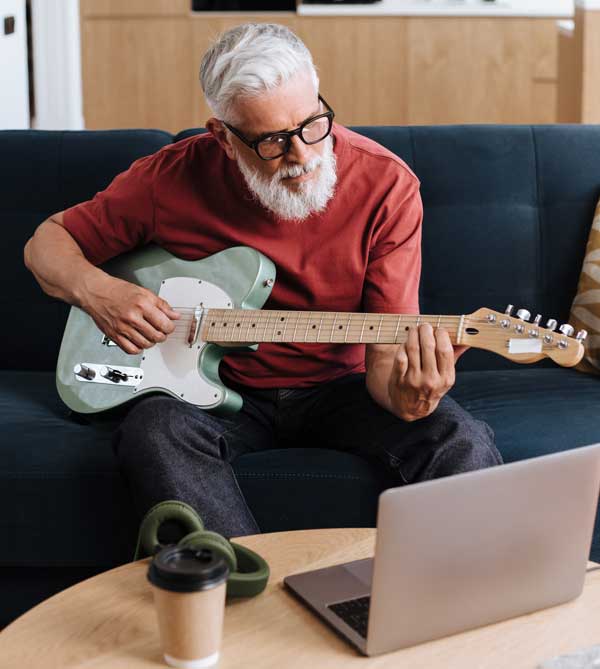
Choose the Right Guitar
When starting out, it’s important to choose the right guitar. There are two main types of guitars: acoustic and electric. Acoustic guitars are great for beginners because they’re easier to play and are often more affordable. Electric guitars are more versatile, but they require an amplifier to produce sound.
Learn the Notes
To start playing guitar, you need to know the notes. The six strings on a guitar are typically tuned to E, A, D, G, B, and E. Start by familiarizing yourself with the notes on the fretboard. The fretboard is the part of the guitar where the frets (the metal bars) are located.
Start with Simple Chords
One of the key things when looking at how to start playing guitar is being comfortable with the chords. Once you’re comfortable with the notes on the fretboard, it’s time to start learning chords. Chords are groups of notes played together. Start with simple chords like C, G, and D. These chords are easy to play and are the building blocks for more complex chords.
Practice the Scales
In addition to chords, you should also practice scales. Scales are a series of notes played in a specific order. Scales can help improve your finger dexterity and build your knowledge of the fretboard. Start with simple pentatonic scales and work your way up to more complex scales.
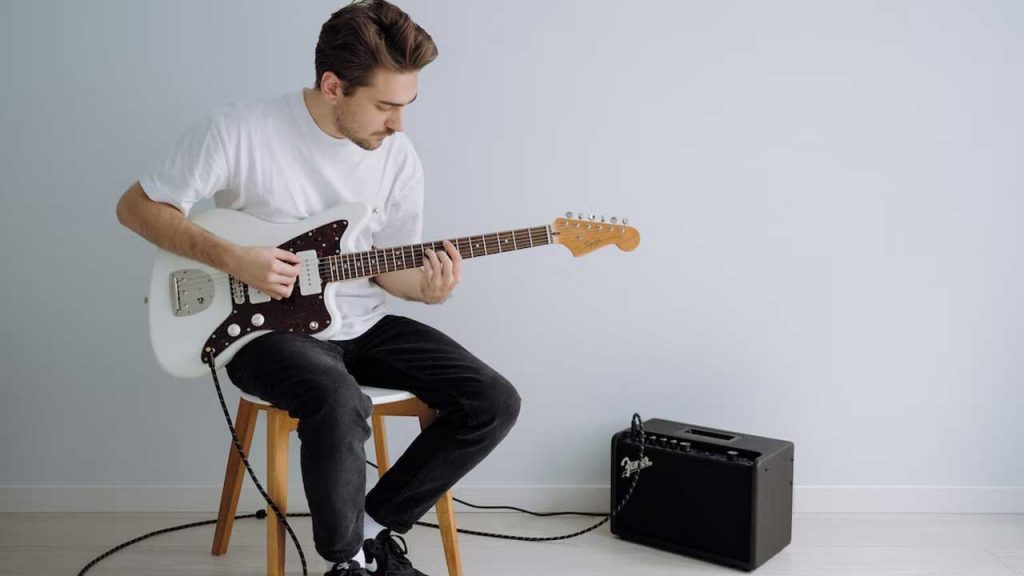
Find a Good Teacher
Finding a good teacher can be a valuable resource when learning how to start playing guitar. A good teacher can provide guidance, answer questions, and give you feedback on your progress. You can find a guitar teacher through local music schools, community centers, or online.
Let the Legends Inspire You!
Finally, get inspired by guitar legends. When considering how to start playing guitar surprisingly, many overlook this tip becasue they consider legends to be way out of their league but it’s not the case, you can learn a lot of techniques from the accomplished legends.
Listen to your favorite guitar players and try to emulate their style. This will not only help improve your playing, but it will also give you a better understanding of the instrument.
Join a Band or Play with Others
It may sound daunting, I know. However the fact is that playing with others can be a great way to improve your guitar playing. Join a local band, find other musicians to play with or just join a community or guitar players.
Collaborating with others can help you develop your skills and gain new insights into the instrument.

Experiment with Different Genres
Don’t limit yourself to just one genre of music. Experiment with different styles, such as rock, blues, classical, and more. This will give you a better understanding of the instrument and help you develop a unique playing style.
Attend Live Performances
Attending live performances is a great way to get inspired and learn from other guitar players. Whether it’s a local open mic night or a concert by your favorite guitar legend, attending live performances can help you improve your playing and gain a deeper appreciation for the instrument.
Invest in Good Equipment
Last but by no means least in our how to start playing guitar list is to be invest in good equipment.
This can make a big difference in your playing. This includes a quality guitar, amp, pedals, and other accessories. While it may be tempting to go for the cheapest option, investing in good equipment will make a noticeable difference in the sound, playability and longevity of your instrument.
By following these tips and incorporating regular practice, you’ll be well on your way to becoming a great guitar player. Keep up the good work!
Author Profile
-
Daniel Johnstone is an English writer with a love for stringed instruments from around the world.
He shares his love for these instruments through his writing for folkstrings.com, a website dedicated to all things related to folk string music.
Daniel's passion for music started at a young age, and he has since become an accomplished musician, playing guitar, cavaco, and recently, the harp.
His dedication to learning and sharing his knowledge of stringed instruments is evident in his insightful and engaging blog posts. Whether you're a seasoned musician or a beginner, Daniel's writing is sure to inspire and entertain you.
When he's not playing music or writing, you can find Daniel exploring new instruments and seeking out new sounds to share with his readers.
Latest entries
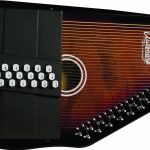 AutoharpApril 4, 2024What Is the Autoharp Made Of: Exploring Its Materials and Craftsmanship
AutoharpApril 4, 2024What Is the Autoharp Made Of: Exploring Its Materials and Craftsmanship AutoharpApril 4, 2024Is Autoharp Easy to Play? Unveiling the Truth for Beginners
AutoharpApril 4, 2024Is Autoharp Easy to Play? Unveiling the Truth for Beginners AutoharpApril 4, 2024What Is an Autoharp Worth? Your Guide to Pricing and Value
AutoharpApril 4, 2024What Is an Autoharp Worth? Your Guide to Pricing and Value AutoharpApril 4, 2024Are Autoharp and Zither the Same Thing? Unraveling String Instrument Myths
AutoharpApril 4, 2024Are Autoharp and Zither the Same Thing? Unraveling String Instrument Myths
Affiliates:
This post may contain affiliate links that at no additional cost to you, the site may earn a small commission. We only recommend products we would use ourselves and all opinions expressed on this site are our own.
Accuracy Advice:
While we strive to provide up-to-date and accurate information, the content in this article may not reflect the most current research or medical guidelines. We encourage readers to do further research and consult with professionals for more personalized advice.
Our Recommendations:
The products and services mentioned in any of our articles are recommended based on our independent research and personal experience. We are not sponsored by any company. We aim to suggest products and services we believe are of high quality and could be beneficial to our readers.

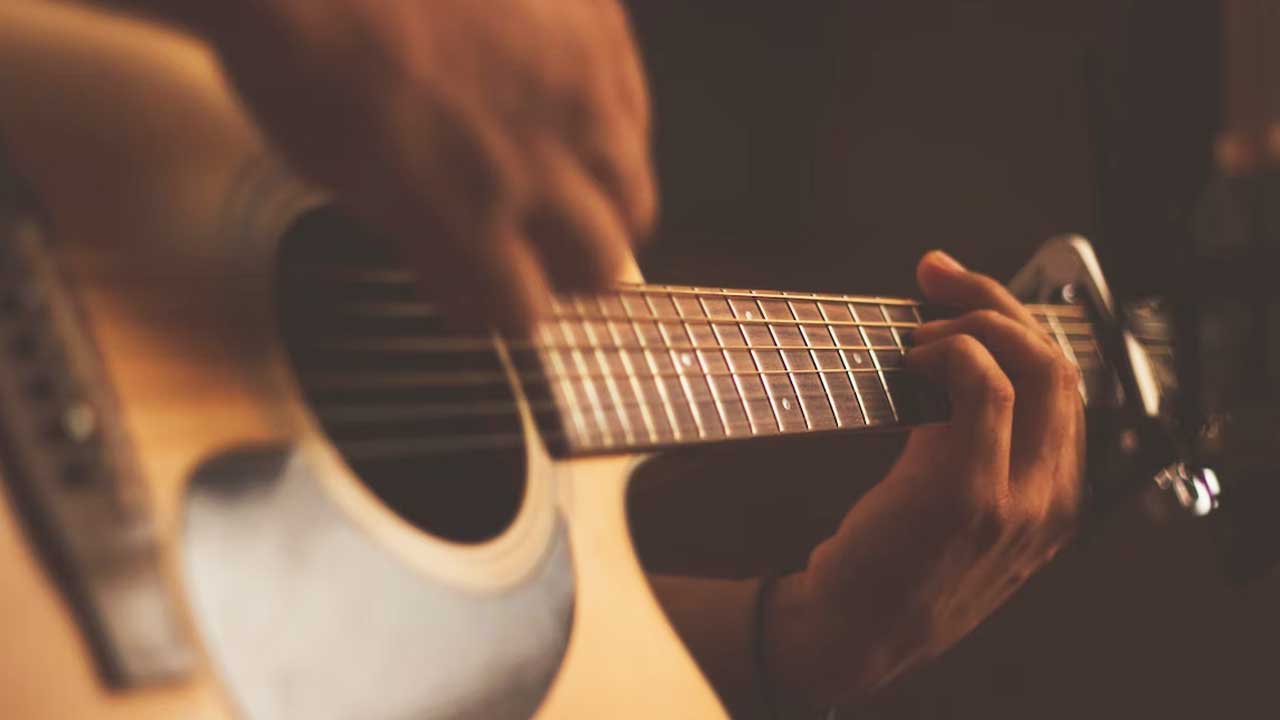
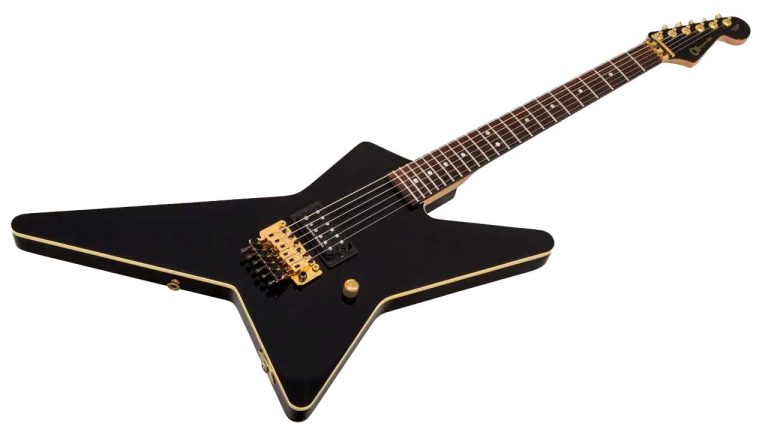
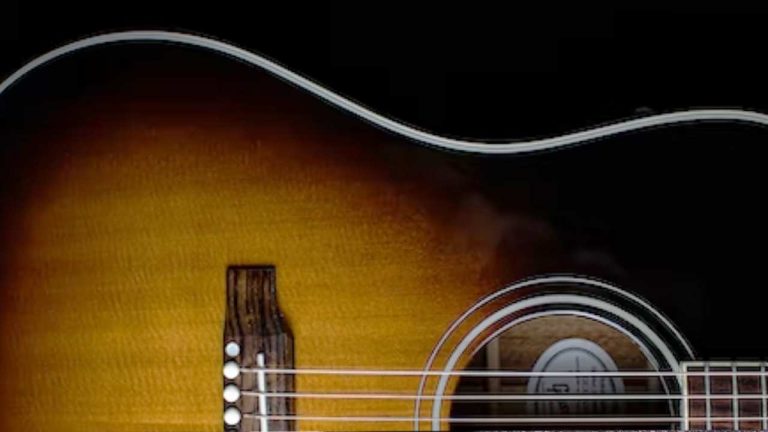

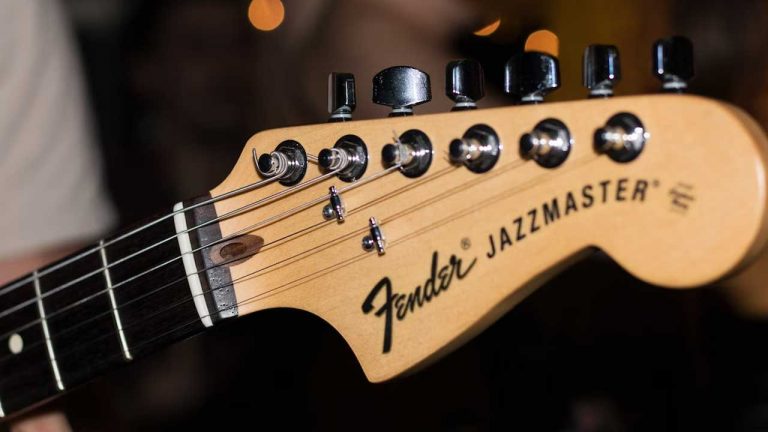
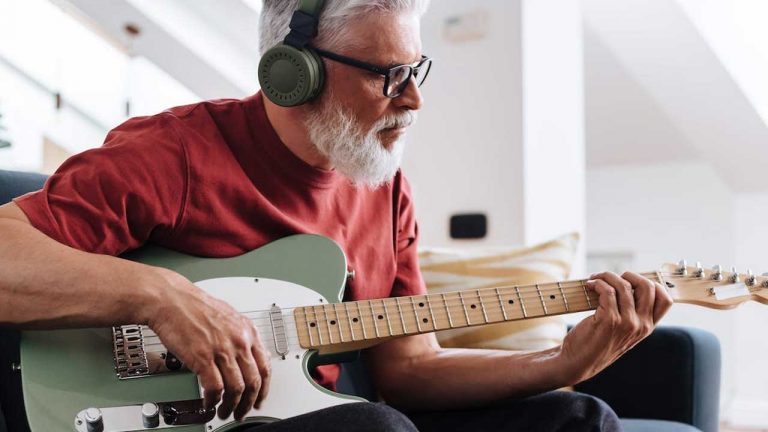
Good article, with great advice. Find a good teacher. And practice! If you practice at least a half-hour every single day without fail, you *will* learn to play guitar. Every day. At least a half-hour. Without fail. A half-hour every day is better than two hours every other day. You are training your brain and your fingers to work as one. Daily practice is the only way to achieve that. And don’t get discouraged. Understand that for the first month or two, you are going to sound horrible! Everybody sounds horrible at first! The people who learn an instrument and play it well are the ones who have the ambition to get past sounding horrible at first. You never heard those people when they started, only after they learned to play well! Practice every day without fail, and you will get past that. And by “practice”, I don’t mean playing what comes easy to you. I mean playing what you do not know how to play yet. You play what you like to play on your own time, not on your practice time! And time spent on playing scales is not wasted time, even if you never use them! You are training your fingers to move the way you want! Besides, you’ll end up using those scales, even if you don’t think you will. Trust me.
The article is correct about acoustic and electric guitars. I usually characterize playing acoustic guitar as like having a conversation with an old friend. Playing an electric guitar can be a wrestling match with a behemoth! The best thing about an electric guitar is that it amplifies every single sound you make! The worst thing about an electric guitar is that it amplifies every single sound you make! It’s usually best to start on acoustic and go to electric later. It can be really hard the other way around.
Choosing a good instrument is important. It is hard to enjoy playing guitar, and it is hard to learn playing the guitar, on a bad instrument. A good instrument that is improperly setup can be corrected. But a bad instrument will always be bad. And the price tag is not always an indicator. I went through a dozen acoustic guitars in a music store once, and I found one for $169 (on sale) that played and sounded better than some that sold for $1,000 or much more. Another time, looking for an f-hole hollowbody jazz guitar, and I spent more than four hours trying three different models. The one I decided upon was not the most expensive; rather, I chose the mid-priced one because it played and sounded better! Play a potential purchase for an hour or more before buying. Don’t buy a guitar quickly. If the store doesn’t understand and knows you want to buy, don’t buy there. If you don’t know how to play yet, find a friend who plays well to help you.
But the thing that will make you sound good the most will be your fingers and their connection to your brain. Someone once said something like, “The guitar is the easiest instrument in the world to play… badly.” Somewhere around ten percent of the American population play guitar, but only a small percentage of those play it well. Practice hard and practice religiously, “every day, at least one half hour, without fail,” and you can be among that smallest percentage! Thank you.